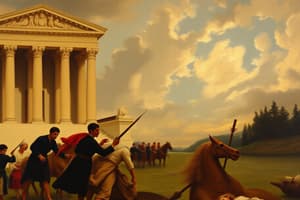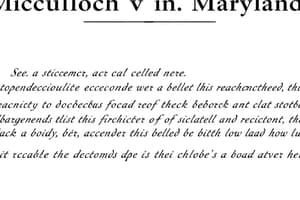Podcast
Questions and Answers
How might the decision in McCulloch v. Maryland make future Supreme Court decisions more complicated?
How might the decision in McCulloch v. Maryland make future Supreme Court decisions more complicated?
The principle of the federal supremacy meant the Court would more often rule in favor of federal powers over those of individual states.
Before McCulloch v. Maryland went to court, what law did the state of Maryland pass?
Before McCulloch v. Maryland went to court, what law did the state of Maryland pass?
Passed a law that required federal banks to pay state taxes.
In McCulloch v. Maryland, what did the state of Maryland argue?
In McCulloch v. Maryland, what did the state of Maryland argue?
Banks cannot be created by Congress.
What is an implied power?
What is an implied power?
Why did William Marbury support the Judiciary Act of 1789?
Why did William Marbury support the Judiciary Act of 1789?
Who was involved in the case of Gibbons v. Ogden?
Who was involved in the case of Gibbons v. Ogden?
How did Gibbons v. Ogden expand the idea of federal supremacy?
How did Gibbons v. Ogden expand the idea of federal supremacy?
What was James Madison's position regarding the Supreme Court in Marbury v. Madison?
What was James Madison's position regarding the Supreme Court in Marbury v. Madison?
Why did James McCulloch MOST likely support the idea that Congress could create banks?
Why did James McCulloch MOST likely support the idea that Congress could create banks?
Which is an example of federal supremacy?
Which is an example of federal supremacy?
Flashcards are hidden until you start studying
Study Notes
McCulloch v. Maryland
- The decision established federal supremacy, allowing the Court to favor federal powers over state powers in future rulings.
- Maryland enacted a law taxing federal banks, challenging the power of Congress.
- Maryland argued that Congress lacked the authority to create banks, highlighting the contentious nature of federal versus state power.
Implied Powers
- Implied powers refer to those that are not explicitly stated in the Constitution but are inferred through interpretation.
Judiciary Act of 1789
- William Marbury supported this act as it provided a legal pathway for him to present his case to the Supreme Court, illustrating the act's significance in judicial proceedings.
Gibbons v. Ogden
- The case involved a dispute between two steamboat company owners, demonstrating interstate commerce issues.
- It reinforced the concept of federal supremacy by affirming Congress's authority to regulate interstate trade.
Marbury v. Madison
- James Madison opposed the ruling made during this landmark case, which established the principle of judicial review, affirming the Supreme Court's role in interpreting laws.
James McCulloch
- McCulloch's likely support for Congress's authority to create banks stemmed from his desire to avoid state taxation on his bank, reflecting personal and political interests.
Federal Supremacy Example
- An instance of federal supremacy is when a state is prohibited from taxing federal funds, reinforcing the hierarchy of laws where federal law prevails over state regulations.
Studying That Suits You
Use AI to generate personalized quizzes and flashcards to suit your learning preferences.




